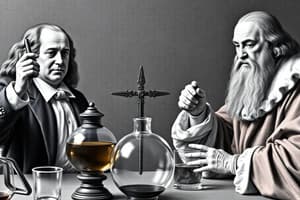Podcast
Questions and Answers
Which scientist's work challenged Newton's laws of gravity by observing the consistent orbital speed of stars in spiral galaxies?
Which scientist's work challenged Newton's laws of gravity by observing the consistent orbital speed of stars in spiral galaxies?
Whose research significantly contributed to our understanding of the origin of the mass of elementary particles, leading to the discovery of a new particle at CERN?
Whose research significantly contributed to our understanding of the origin of the mass of elementary particles, leading to the discovery of a new particle at CERN?
Which scientist is renowned for their contributions to calculating trajectories for space missions, playing a pivotal role at NASA?
Which scientist is renowned for their contributions to calculating trajectories for space missions, playing a pivotal role at NASA?
Whose work primarily focused on the origin of elements within stars and the creation of the chemical elements?
Whose work primarily focused on the origin of elements within stars and the creation of the chemical elements?
Signup and view all the answers
Which scientist contributed significantly to space technology by working on a specialized propulsion system, enabling spacecraft to maintain stationary orbits?
Which scientist contributed significantly to space technology by working on a specialized propulsion system, enabling spacecraft to maintain stationary orbits?
Signup and view all the answers
Whose research explained the nature of the weak nuclear force and unified it with the electromagnetic force?
Whose research explained the nature of the weak nuclear force and unified it with the electromagnetic force?
Signup and view all the answers
Which scientist investigated chromosomal abnormalities associated with genetic disorders such as Down syndrome?
Which scientist investigated chromosomal abnormalities associated with genetic disorders such as Down syndrome?
Signup and view all the answers
Which scientist advocated for the steady-state theory of the universe?
Which scientist advocated for the steady-state theory of the universe?
Signup and view all the answers
Which scientist explored the possibility of life on Earth originating from organic molecules delivered by comets?
Which scientist explored the possibility of life on Earth originating from organic molecules delivered by comets?
Signup and view all the answers
Which scientist's discovery earned them the National Medal of Science?
Which scientist's discovery earned them the National Medal of Science?
Signup and view all the answers
Flashcards
Fred Hoyle
Fred Hoyle
British astrophysicist known for nuclear reactions in stars and steady-state theory.
Steady-state theory
Steady-state theory
The universe's average density remains constant as new matter is created.
Katherine Johnson
Katherine Johnson
Mathematician crucial for calculating trajectories for space missions.
Electroweak theory
Electroweak theory
Signup and view all the flashcards
Higgs boson
Higgs boson
Signup and view all the flashcards
Vera Rubin
Vera Rubin
Signup and view all the flashcards
Irene Uchida
Irene Uchida
Signup and view all the flashcards
Higgs field
Higgs field
Signup and view all the flashcards
Yvonne Brill
Yvonne Brill
Signup and view all the flashcards
Nobel Prize in Physics 1979
Nobel Prize in Physics 1979
Signup and view all the flashcards
Study Notes
Scientists and Their Achievements
-
Fred Hoyle (1915-2001): British astrophysicist who studied the origin of elements in stars. He proposed that elements form gradually through nuclear reactions within stars. He also supported the steady-state theory of the universe. Later in his career, he focused on organic molecules in comets.
-
Katherine Johnson (1918-): Award-winning mathematician who played a crucial role in calculating trajectories for many space missions. This included the Apollo 11 mission. She worked at NACA (National Advisory Committee for Aeronautics) and NASA, performing complex calculations manually.
-
Yvonne Brill (1924-2013): Worked in aerospace engineering. She designed propulsion systems for unmanned spacecraft and contributed to rocket design and weather satellite technology—even US Moon missions.
-
Abdus Salam (1926-1996): Pakistani physicist. His work was centered around uniting the electromagnetic force with the weak nuclear force. He developed the electroweak theory. His theories were confirmed at CERN (European Organization for Nuclear Research) earning him a Nobel Prize in 1979.
-
Vera Rubin (1928-2016): Astronomer who discovered that stars in the outer parts of galaxies move as fast as stars closer to the center. This challenged Newtonian gravity and helped prove the existence of dark matter. She observed 60 spiral galaxies.
-
Peter Higgs (1929- ): British physicist who proposed the Higgs field and the Higgs boson to account for the masses of elementary particles. This theory was important in understanding how particles gain mass. His work led to the development of the Large Hadron Collider (LHC) and the eventual discovery of the Higgs boson. His prediction had significant implications for particle physics. His theory was confirmed at CERN leading to the Nobel Prize in 1979.
-
Irene Uchida (1917-2013): Canadian medical geneticist who researched the effects of genes and chromosomes on human health. She investigated genetic conditions and congenital abnormalities. Research focused on how chromosomes and genes relate to health. Research included Down syndrome.
Additional Details
- NASA: The US space agency, which the mentioned scientists supported, and made significant contributions to.
- CERN: The European Organization for Nuclear Research where significant discoveries were made.
- Nobel Prize: Several of the scientists were awarded this prestigious prize for their exceptional contributions to their respective fields.
Studying That Suits You
Use AI to generate personalized quizzes and flashcards to suit your learning preferences.
Description
Test your knowledge of notable scientists and their significant contributions to science. This quiz covers influential figures such as Fred Hoyle, Katherine Johnson, Yvonne Brill, and Abdus Salam. Learn about their achievements and impact on various fields like astrophysics, mathematics, and aerospace engineering.




